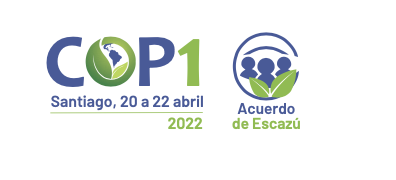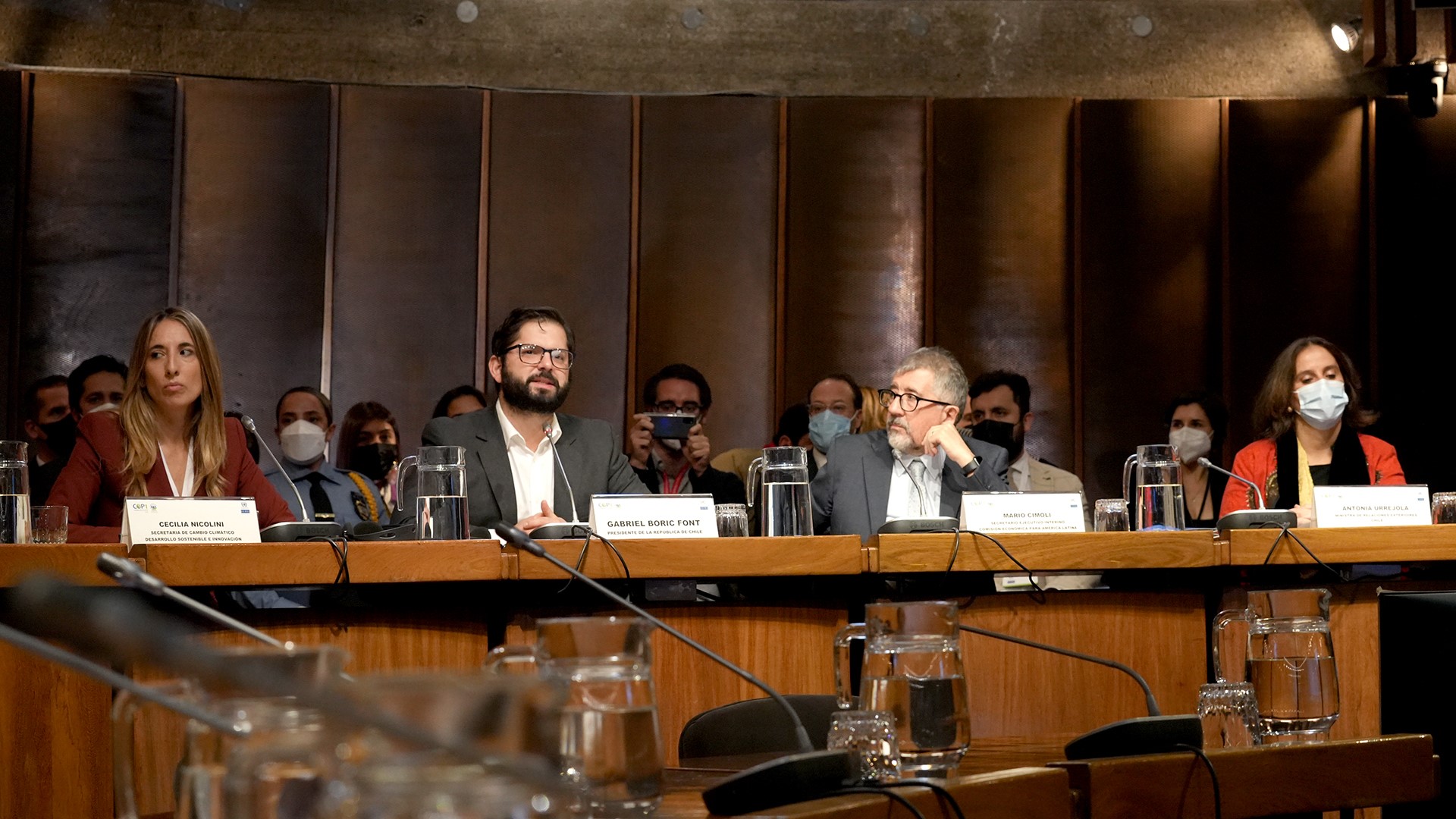
20-22 Apr 2022 Santiago, Chile | Conferences and meetings of subsidiary bodies

The first meeting of the Conference of the Parties (COP 1) to the Regional Agreement on Access to Information, Public Participation and Justice in Environmental Matters in Latin America and the Caribbean – known as the Escazú Agreement – began this Wednesday, April 20 at ECLAC’s headquarters in Santiago, Chile, with a call by the States Parties and other nations that are in the process of ratification or accession, to foster joint action and multilateralism to give fresh impetus to the region’s first environmental treaty, and thereby move forward on environmental protection and the social inclusion and economic development of all its inhabitants.
The meeting – where participants will review progress on the Agreement’s implementation and move ahead on making it operational – was officially inaugurated by the President of Chile, Gabriel Boric, at a ceremony that also featured the participation of Epsy Campbell Barr, Vice President of Costa Rica (virtually); Cecilia Nicolini, State Secretary for Climate Change, Sustainable Development and Innovation of Argentina; Andrea Sanhueza and Karetta Crooks-Charles, elected representatives of the public; and Mario Cimoli, Acting Executive Secretary of the Economic Commission for Latin America and the Caribbean (ECLAC), the organization that serves as the Escazú Agreement’s Secretariat.
“The Escazú Agreement comes into being as a response to the urgent needs of our region, which regrettably has become the most dangerous area in the world for environmental defenders. And it embodies deep desires on the part of the peoples living in this corner of the Global South: desires for peace, desires for justice, desires for decisive action amid the climate crisis and the environmental degradation that we are facing,” President Boric stated in his inaugural remarks.
“Either we save ourselves together, or we sink separately. I believe that the Escazú Agreement aims precisely for the idea of saving ourselves together, of working together. I am interested in this, and I reaffirm it here, that Chile is a deeply Latin American country and we are proud of that. Therefore, we are going to work alongside our Latin American brothers and sisters to face the climate crisis provoked by man’s actions, using the criteria of climate justice as well,” the Chilean leader added.
“Today, Chile is participating in this conference as an observer and host, and I hope that we will soon become a State party. With this agreement, the region is moving forward today on its task of ensuring growth and development in sustainable conditions of stability. In these rooms, the multilateralism, trust and collaboration that our world so sorely needs has come alive,” Boric concluded.
Meanwhile, the Vice President of Costa Rica, Epsy Campbell, said that with the Escazú Agreement, the peoples of Latin America invoke one of their most cherished values: the love of nature. “Over hundreds of years, our cultures have understood that the love of nature is critical for ensuring the survival of the human species and that we are truly capable of building harmonious relations with the environment,” she sustained.
“Ladies and gentlemen, we have run out of time, climate change is overtaking us. And the most vulnerable communities are women, indigenous peoples and Afro-descendent peoples; they are the poorest people who are bearing the brunt of this crisis. In this context, the Escazú Agreement serves as a framework instrument of high standards for Latin America and the Caribbean to foster responsible investment and provide distinct actors with the tools to improve transparency and environmental safeguards,” Vice President Campbell stated.
Meanwhile, the State Secretary for Climate Change, Sustainable Development and Innovation of Argentina, Cecilia Nicolini, indicated that what has been enshrined in the Escazú Agreement (or “Escazú”) distills our region’s ambitions, priorities and particularities. “In Argentina we understand Escazú as a commitment to multilateralism, a commitment to South-South cooperation for enhancing our institutional capacities amid a global context of uncertainty and imbalances,” she affirmed.
The elected representatives of the public, Andrea Sanhueza and Karetta Crooks-Charles, stressed the importance of the Escazú Agreement as a strategic tool that States will implement so that indigenous peoples, the private sector and citizens in general can participate in decision-making on any environmental issue and its implementation. They also noted that the Agreement has the ability to protect the environment, protect environmental defenders, and safeguard a healthy environment for present and future generations.
In his welcome remarks, the Acting Executive Secretary of ECLAC, Mario Cimoli, gave special thanks to Chile’s President Gabriel Boric, its Minister of Foreign Affairs, Antonia Urrejola, and its Minister of the Environment, Maisa Rojas, for their support in this meeting and for having resumed the country’s leadership in the process for joining the Escazú Agreement.
He also sent very affectionate greetings to Alicia Bárcena, the former Executive Secretary of ECLAC – who is attending the meeting – “because her political leadership was key to this Escazú Agreement becoming a reality today. Thank you, Alicia, and the entire ECLAC team that accompanied countries in this important process,” he emphasized.
ECLAC’s Acting Executive Secretary added that the Escazú Agreement is the first binding regional treaty on the environment, and it includes the world’s first provision on human rights defenders in environmental matters. “It is an instrument for social transformation and the deepening of democracy,” he stated.
“At a time when multilateralism faces such great tensions, where we cannot find the threads to resolve the bundle of serious problems that we have, where many things are happening outside of our control: war, death, hunger. In other words, in a complex situation, the fact that Latin America and the Caribbean is gathering here to discuss an Agreement that has an environmental foundation and gives rights and citizenship, should make us feel very proud,” Mario Cimoli said.
He also indicated that the Escazú Agreement generates greater investment and is the basis for new technologies. “This agreement is for growing better and providing direction for growth, but not just any growth: it must include distribution and allow for keeping the environmental aspect quite clear,” he explained.
“Complex times are on the horizon. That is why Latin America and the Caribbean should make a call to the world. Environmental justice and democracy are possible, as the Escazú Agreement demonstrates. This is a historic day. You can count on ECLAC,” the Commission’s Acting Executive Secretary concluded.
The first day of COP1 of the Escazú Agreement continued with a panel on the national actions taken by the 12 States Parties (Antigua and Barbuda, Argentina, Bolivia, Ecuador, Guyana, Mexico, Nicaragua, Panama, Saint Kitts and Nevis, Saint Vincent and the Grenadines, Saint Lucia and Uruguay) as well as other countries, and on the activities carried out by the Secretariat (ECLAC). Furthermore, a special session was held on the effective implementation of the Escazú Agreement and greater cooperation, in which representatives of international and intergovernmental organizations explained the Agreement’s relevance for the region.
In addition, the Presiding Officers of the Escazú Agreement were elected by the representatives of the States Parties present at the meeting, with Uruguay chosen to serve as chair, Argentina and Saint Lucia as vice chair, and Antigua and Barbuda and Mexico as members.
During this three-day meeting, participating countries will also address the COP’s rules of procedure, including the modalities for significant participation by the public (article 15.4a of the Agreement); the financial provisions that are necessary for the functioning and implementation of the treaty (article 15.4b); and the rules relating to the structure and functions of the Committee to Support Implementation and Compliance (article 18.1).
On Friday, April 22, a high-level event will be held on the celebration of the first anniversary since the entry into force and International Mother Earth Day, which are commemorated on that same date.
Also, from April 19 to April 22, around 30 official side events will take place virtually in the framework of the conference.